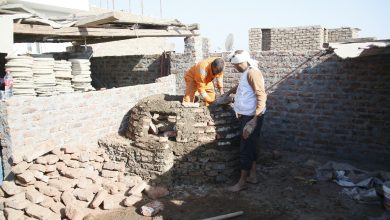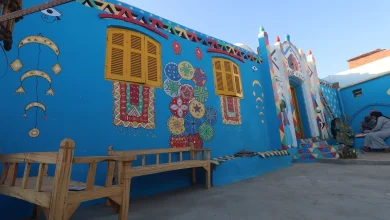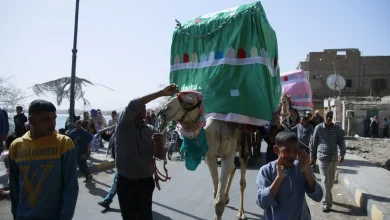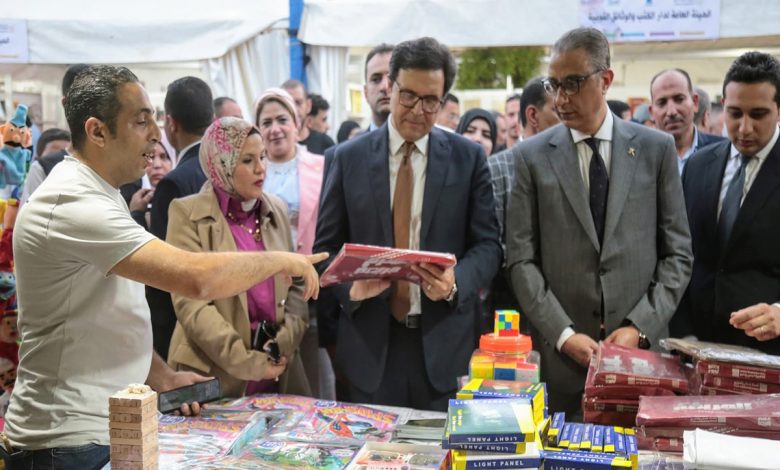
Despite controversy, the Fayoum Book Fair sparks cultural movement in the governorate
The events of the first Fayoum Book Fair 2025 (dedicated to artist Abdel Rahman Rushdi, 1881–1939), organized by the Egyptian General Book Authority in cooperation with the Fayoum governorate and club, will continue until Wednesday.
Cultural seminars and discussion sessions were held on the sidelines of the exhibition, among the book stalls. Between supporters and opponents, the Fayoum Book Fair remains an important event that deserves attention.
Although the fair was planned hastily and accompanied by some organizational challenges that sparked discontent among a number of writers and those interested in cultural affairs, it achieved some cultural gains. Bab al-Masr met with a number of people interested in cultural work in Fayoum to hear their views.
Abdul Rahman Rushdi
The Ministry of Culture indicated in its statement that all sectors of the ministry participated in preparing for the exhibition and its events. These included the General Authority for Cultural Palaces, the National Theater Center, the Children’s Culture Center, and the Fayoum Culture Palace. Eleven private publishing houses also participated for the first time. The Egyptian General Book Authority oversaw the organization. The exhibition was named after the great artist and theater director Abdel Rahman Rushdi, a native of Fayoum. A documentary film about him was screened at the opening of the exhibition.
Hisham Masoud Al-Alaqi, author of the book Fayoum: Secrets and Stories, said of the artist after whom the first edition was named: “The artist Abdul Rahman Rushdi was born in the governorate of Fayoum in 1881. He is considered one of the pioneers of the Egyptian theater movement. He studied law and worked as a lawyer in Fayoum, where his office was located in the Sheikh Mariam neighborhood. However, he resigned from his job and joined the George Abyad troupe in 1913.”
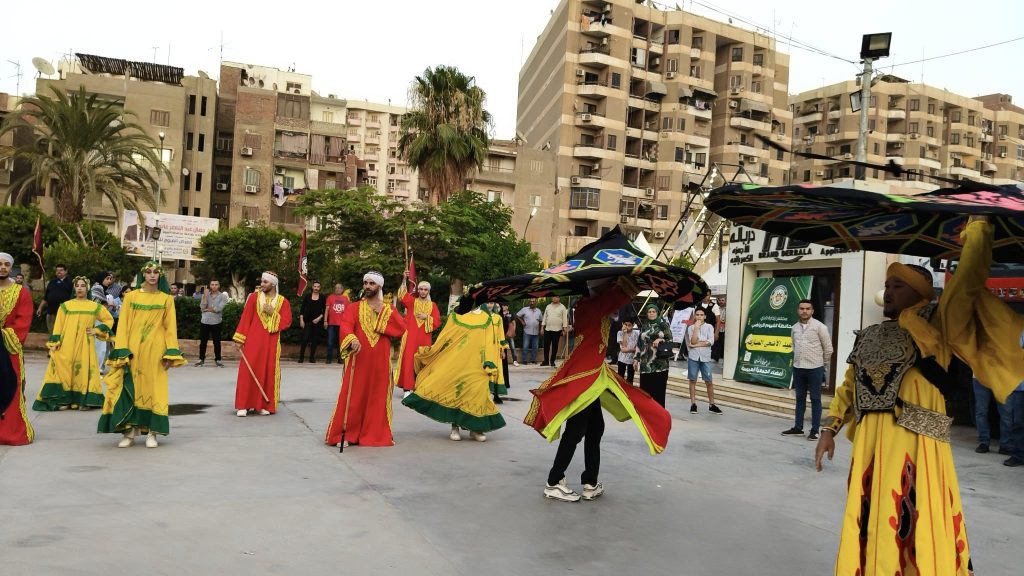
The exhibition greatly pleased many artists and intellectuals in Fayoum, due to the seminars and artistic and cultural activities it included, and the cultural movement it sparked. This was confirmed by artist and theater director Ezzat Zain to Bab Masr. He said, “The importance of the exhibition organized by the Egyptian General Book Authority stems from the fact that Fayoum has been deprived of any cultural activity of this magnitude for nearly four years due to the closure of the Palace of Culture under the pretext of maintenance.
I see the exhibition as a great opportunity for the people of Fayoum to gather and participate in cultural and artistic meetings and evenings held on the sidelines of the exhibition, which has breathed new life into cultural work that I saw as dead.” He continued: “I am very happy with what the exhibition has achieved in its first edition. It has been decided that it will be held annually, and most importantly, we will have a permanent outlet for selling books published by the Egyptian General Book Authority.
Planning the exhibition
Dr. Mohamed Rabie Hashim said: “The idea of holding the Fayoum Book Fair came up at the same time as the fourth Fayoum Literary Conference at the end of April, which was announced by poet Ashraf Abu Jaleel during the conference’s opening ceremony. The conference secretariat worked really hard to get the fair ready for July.”
The exhibition committees were formed after the conference, with a higher committee headed by media figure Abdel Hakim Al-Luwaj and including Dr. Mervat Abdel Azim, member of the House of Representatives, along with a number of people interested in cultural and public work in Fayoum. The second committee was the planning committee, which was responsible for setting the full program for the exhibition and included poet Ashraf Abu Jaleel, Dr. Mohamed Rabie Hashim, critic Ghada Dakroury, Dr. Ashraf Abdel Karim, short story writer Aweis Maazouz, and poet Ahmed Faisal.
The committee contacted the critics and provided them with the literary works to be discussed. The executive committee assigned the task of coordinating with the Egyptian General Book Authority to poet Ashraf Abu Jaleel, the general coordinator of the exhibition, who submitted the complete program to the authority for implementation.
Lack of communication with writers
The lack of communication with writers and intellectuals and the Authority’s failure to publish the exhibition program, including seminars and panel discussions, upset many people, especially those whose names were included in the events without prior coordination.
Writer and novelist Mohamed Jamal al-Din told Bab al-Masr: “The General Book Authority realized at the last minute the anger that had gripped writers and authors due to the lack of communication with them shortly before the events. This is to its credit, as it communicated and reached an understanding with many of them and sent invitations. This is a good thing, so that the events of the exhibition are not reduced to specific individuals.”
An acceptable start
Jamal al-Din adds: “I think the exhibition, as a first edition, is an acceptable start, but it lacks titles. If we look, for example, at the pavilion of the Supreme Council for Culture, we find only 60 or 70 books.
They were displayed haphazardly to fill the shelves, and perhaps the children’s books were the best in terms of form and content. As for the General Authority for Cultural Palaces pavilion, despite the abundance of books, the titles are poor in my opinion and do not satisfy the ambitions of the discerning reader or intellectual.
I was expecting much more than that. I think there are many names that have come to the fore without merit. Nevertheless, the cultural movement in Fayoum is growing and gaining momentum. It is good to hope for continued development. The Authority must be aware of what has happened and work to remedy it.
Dictatorial practices
Some poets and writers boycotted the exhibition. Commenting on this stance, poet and member of the Fayoum Literature Club Osama Sanad said:
“As for my boycott of the events, I have never boycotted state institutions or state activities, and I have no position against the organizing body, which is the General Book Authority, for which we have the utmost appreciation and respect. However, I boycotted the events—along with others—because of a group that claims to be responsible for organizing the exhibition.
What we wanted was clarification from the General Book Authority regarding the organizer of the exhibition, which did not happen at first. We are boycotting the activities of the group that launched an initiative under the title “Fayoum Rises Again.” We were optimistic about it at first and wanted to work with them collectively to present an independent cultural activity. This was in addition to the activities we offer at the literature club and within cultural institutions in general.
However, we were surprised by the group’s dictatorial practices and their tendency to simply gather people without considering the quality or usefulness of the activities on a creative level. They also rejected all our suggestions for developing the activities, so our withdrawal was a natural step.
The commission did not clarify at the outset that it would be responsible for organizing the event, and even the events themselves were hijacked for the benefit of certain individuals. However, we are not calling for a boycott of the exhibition. We believe our position is impartial, ethical, and entirely justified, because the events do not meet our aspirations as writers.”
A positive step and a great opportunity
Nevertheless, Sanad says that holding a book fair in Fayoum is a positive step and a great opportunity for any reader or intellectual in Fayoum, and it should be taken advantage of by purchasing books offered by government agencies and institutions. These entities are known for their discounted prices.
He added that the fair will save the people of Fayoum the time and effort they would have spent visiting the Cairo fair. He called on all intellectuals in Fayoum to take advantage of the fair and buy valuable books at affordable prices.
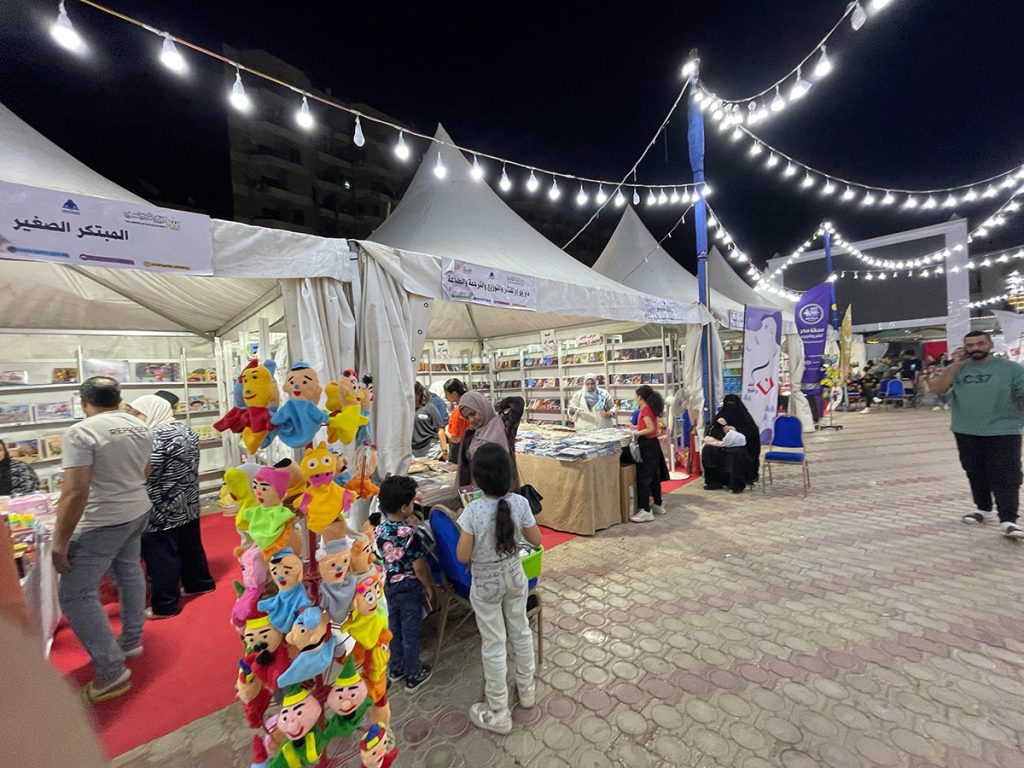
Permanent bookstore
Despite objections to the organization, a permanent bookstore emerged for the first time in Fayoum as one of the gains of the exhibition, giving hope that this cultural initiative will not be a passing event, but rather an annual tradition that will develop over time.
This was confirmed by Dr. Khaled Abu Al-Lail, Deputy Chairman of the Egyptian General Book Authority, who told Bab Masr: “The first Fayoum Book Fair 2025 is being held under the auspices of the Ministry of Culture, in cooperation with the Fayoum Governorate and Fayoum University, and is being organized by the General Book Authority. The organization and coordination took place in just fifteen days, which is a relatively short time, and this may lead to some negatives, but we are facing an important event that has restored cultural enthusiasm to Fayoum.”
He continued: “This is the first exhibition of this size in the governorate in terms of participation and public turnout, which is a good thing. We tried to minimize the negatives as much as possible. We see the writers and intellectuals of Fayoum as figures we are proud of. I personally contacted many of them and invited them to participate in the events.
Great gains for future editions
Abu Al-Lail added: “I believe there are significant positives and gains, and we must all support them and build on them in future sessions to ensure the continuity of the exhibition. Among the gains is the approval of a permanent outlet for selling the Authority’s books at the Fayoum Governorate Club. Many entities in Fayoum have welcomed the provision of other outlets for selling books in the governorate, including the Bar Association.
MP Emad Saad Hamouda also announced the allocation of 40,000 pounds to be awarded in prizes on the sidelines of the exhibition in the coming years in the fields of poetry, novels, short story collections, and critical studies.
Abu Al-Lail concluded his speech by saying, “We extend our invitations and welcome everyone’s participation. We have a whole year ahead of us until the next session, and we hope that everyone will participate with their suggestions and programs. I hope that we will not stop at criticism alone, but that we will all share and cooperate to make the future better.”

